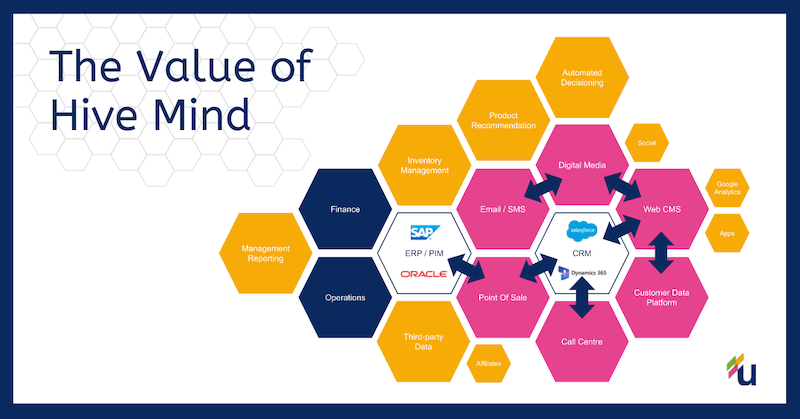The process of unifying data has been proven to enhance the customer experience.
Customers increasingly expect instant, real-time responses to their questions and self-service options available on their chosen communication method and from any device.
Connected systems and data are a key part of the omnichannel experience. Today’s customers expect communication and service across all channels, requiring your systems to be connected, your data consistent, and made available across your customer-facing channels.
Create a hive mind for consistent customer experience.
Data and systems work together, creating what we call the hive mind. A 360-degree view of customers and the business provides actionable insights and personalised customer communications.
Integrating systems and data is not just about different systems talking to each other but also about combining information from different sources within a system and making sure any updates are cascaded to those systems that need them in a timely manner. Sales, Marketing, Operations and Customer service need the correct data at the right time to deliver a great customer experience.

The method used by customers to interact with your company should be seamless and provide the customer with a great experience using the tools of their choice, whether that’s WhatsApp, online chat or a call. It’s important to determine how you capture and present information to them.
Connected systems and data help create an environment for innovation and experimentation, as it is easier to test new ideas. With this in mind, it’s crucial for businesses to examine their current systems and processes and identify areas where they would benefit from the addition of connected systems and data. Once you’ve identified these areas, take the next step by seeing which vendors offer solutions that can help you reach your goals, and then evaluate those vendors based on several key factors.
Additionally, analysing your business goals and needs ahead of time will allow you to develop an accurate budget and realistic delivery timeline. Followed by a test plan to make sure that your project is successful.
How do you connect systems and data to deliver a great customer experience? Here are 5 steps that will help:
1. Develop a systems interface map to see what systems are open, and systems might need to extract data to be consumed by your other systems
a. Does having to perform a disconnected data extract impact the frequency of updates that impact your user and customer experience?
b. Can you even extract data from your legacy systems? (If not, it’s easy to make the decision to wave goodbye to those systems.)
2. Make sure your system selection process provides the future-proofing you need:
a. How open is the solution?
b. Are there out-of-the-box integrations with other systems you are using?
c. Does the solution do at least 75-80% of what you need? If not, you will end up in a long-drawn-out development cycle which will be expensive and unlikely to deliver. Make your decisions on what is available at the time of purchase.
3. What compromises might you have to make to deliver on your strategy?
a. No system will be able to deliver 100% of what you need. So you will have to make compromises. If those compromises are key to your delivery—you are looking at the wrong solution.
b. Compromise at your peril. There are some great marketing solutions out there, but some perform better at inbound marketing, whilst others perform better at outbound marketing. Get this wrong, and your marketing strategy is at risk.
c. re you B2B or B2C? It’s essential that you don’t try and change a B2B solution to a B2C solution—it won’t work no matter how exciting the solution looks and how much the solution provider tells you it will work—test it!
4. Can your existing system suppliers or potential new suppliers help you with integrating their systems? We’ve heard the term “ambitious companies” used by many suppliers to mean “we expect you, the customer, to do the integration.”
a. Ask for examples where this might have worked and also ask to speak to existing or past customers who have performed their own integrations.
b. What costs will you incur as you ask your suppliers to help with integration, increase users, data storage and functionality?
5. Will you need to invest in middleware, such as a Master Data Management (MDM) solution? This is a manageable issue if needed, as MdMs excel in data cleansing, mapping, transformation and creation of the Golden Record. If you need to implement an MDM, be mindful of the cost model and how much data storage they need (often MDMs keep copies of all source data, so if there are any issues, the data can be remapped at any time).
a. What is the MDM cost model—number of records processed, number of native connections (SQL, Oracle etc.)?
b. Test some data using the solution—you need to ensure data can be processed in line with your business need—even in real-time.
c. Data matching refinement—how easy is it to unwind and start again if your matching algorithms are not working?
Data Unification Takeaways
Connected systems and data are essential for providing a consistent customer experience and measurable implementation outcomes. Data unification helps to safeguard the single source of truth, which streamlines operations, and security whilst reducing costs.
ABOUT
We are Unify data consultancy—CRM, data and analytics specialists for enterprise-level organisations. We work with companies who have started or about to start their digital transformation and help customers to use their data to drive actionable outcomes and drive business efficiency. Contact us today to find out how our CRM consulting services can help your digital transformation programme or to conduct a customised data and operational process audit for your business.

